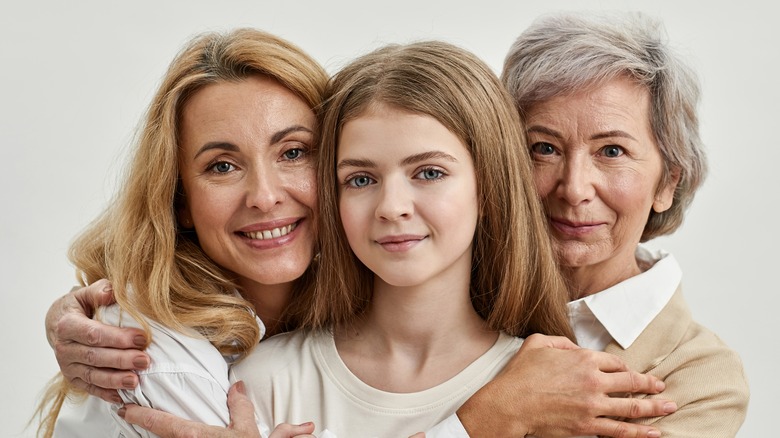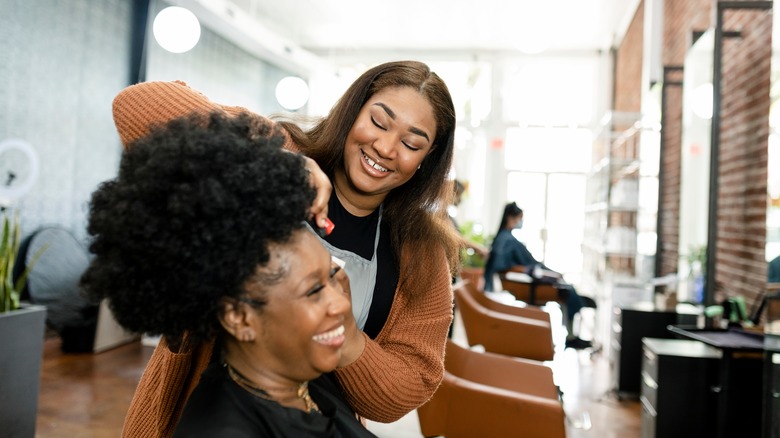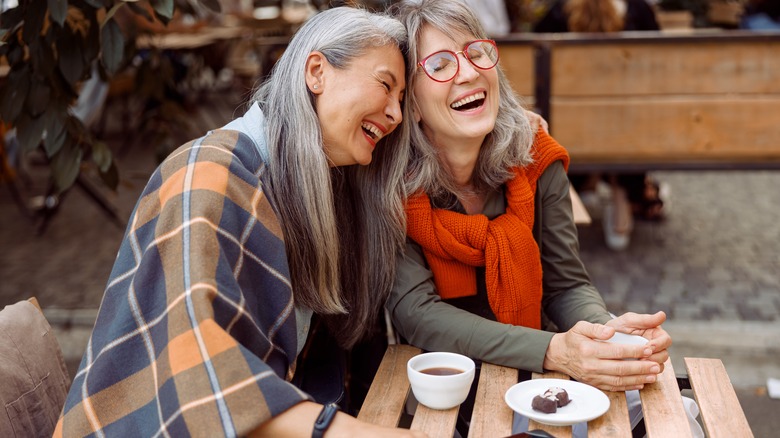What Happens To Our Hair As We Age?
Aging is a normal process of life and as we age our bodies begin to change, especially our hair. While luscious locks may be beautiful to gaze at, hair plays a special role in making sure our bodies are healthy. Hair (and nails) protect our bodies and help regulate our body's temperature, explains MedlinePlus. In addition, your hair may also signal the health of your body. It can let you know if there's a nutritional gap in your diet, when you're stressed, if there's a thyroid issue, or if there are other health problems such as anemia (per Everyday Health). So then what happens to our hair as we age?
First and foremost, board-certified hair transplant surgeon, Dr. Craig Ziering explains that our bodies begin changing at a cellular level around our early 20s (via InStyle). When this happens the hair may be affected but it's not visible to the eye. Rather, "for the hair, the process of aging takes place below the hair's surface at the hair follicle, specifically the hair root or bulb," points out Dr. Ziering to InStyle. Over time the hair growth rate begins to slow down and genetics also play a role in how our hair changes, shares MedlinePlus. Together these each produce some warning signs that our hair is inevitably aging. Let's find out what those signs are.
The thickness of your hair changes
According to Healthline each hair strand on your scalp has a growth cycle of approximately two to six years. Once the hair reaches the end of its growth cycle, the hair strand falls out and is then replaced, points out MedlinePlus. But as you age, this process changes. "Oxidative stress affects the scalp function by disrupting the hair growth cycles, decreasing lipid production, which affects the shine, smoothness, and softness of hair fibers, while changes in hormones as a result of aging affect the diameter of the hair fiber making it thinner," explains certified trichologist, Bridgette Hill, to InStyle. Hair follicles stop making more hair and this leads to thinning, points out Healthline.
Additionally, hair loss can also happen with age due to changes in hormones, explains Healthline. Hair strands take longer to grow and they may also be smaller in size (via MedlinePlus). When this happens the scalp is more visible and a person (male or female) may experience baldness. In men, this is called male-pattern baldness and in women, it's called female-pattern baldness (per MedlinePlus).
Dryness, which is another sign of aging hair, can also affect the thickness of the hair. Hill explains that coily and curly hair types tend to experience more dryness because the hair shaft has a harder time retaining moisture (per InStyle). People with this hair type are more prone to dryness which can lead to breakage as they age, points out Healthline.
Your hair color changes too
Going gray is another common sign that your hair is aging. "Hair follicles get smaller, sebum production declines, and some people lose pigment cells and go gray," shares dermatologist, Dr. Francesca Fusco to WebMD. This happens when the hormones change in the body and cause the pigment-producing cells to slow down. These cells are called melanocyte cells, and they contain melanin which is a pigment-producing element that gives your hair its color (via Healthline). As melanocyte cells decrease, gray hair pops up more and more. On the other hand, dermatologist Dr. Janiene Luke notes that if white hair is showing up that's a sign there's no melanin in the hair strand (per Healthline).
According to MedlinePlus graying typically occurs around age 30. While scalp hair is one of the most noticeable signs of going gray, it can also happen to other areas of the body. Facial hair can turn gray and other body hair can potentially turn gray like chest, armpit, or pubic hair, points out MedlinePlus. Although the latter is less common. In addition, this is heavily influenced by your genes (per MedlinePlus).
Even though hair changes as we age, there are some anti-aging tips that may help you feel more confident with your new hair. WebMD suggests focusing on your diet (i.e. getting protein and antioxidants), having the right haircut, moisturizing your hair, and adding body to your hair. These tips may help keep your hair healthy and glowing over time.



